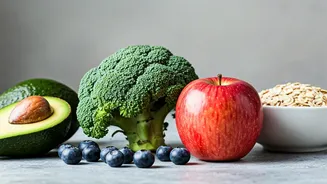Oats: Heart's Best Friend
Oats stand out as a cholesterol-lowering champion due to their high soluble fiber content. This fiber binds with cholesterol in your digestive system,
preventing its absorption into the bloodstream. Including oats in your diet can significantly contribute to lowering LDL cholesterol, often referred to as 'bad' cholesterol. Consuming a bowl of oatmeal for breakfast is a simple yet effective way to start your day, or you can add oats to smoothies or use them in baking. Studies suggest that eating just one and a half cups of cooked oatmeal daily can reduce total cholesterol by 5-8% and LDL cholesterol by 7-10%. This makes oats a readily available and beneficial food for supporting heart health. Remember to choose plain oats and avoid those with added sugars to maximize their benefits.
Beans: Fiber Powerhouse
Beans, much like oats, are packed with soluble fiber, making them excellent for lowering cholesterol. Fiber not only helps bind cholesterol but also slows down the absorption of sugar, which can indirectly help in maintaining healthy cholesterol levels. There are many varieties of beans to choose from, including kidney beans, black beans, navy beans, and lentils. Incorporating beans into your diet is versatile; you can add them to soups, stews, salads, or even make bean-based dips. Eating about a half cup of beans daily can lower LDL cholesterol by up to 10%, offering a delicious and affordable way to improve your heart health. Beans also offer the added advantage of being a great source of plant-based protein, which helps in feeling full and managing weight.
Nuts: Healthy Fats Boost
Nuts, particularly almonds, walnuts, and cashews, are beneficial for lowering cholesterol due to their healthy monounsaturated and polyunsaturated fats. These fats help lower LDL cholesterol while increasing HDL cholesterol, often referred to as 'good' cholesterol. A handful of nuts per day can make a significant difference in your cholesterol profile. These nuts are easy to add to your diet as snacks, toppings for salads, or ingredients in recipes. For example, eating just 1.5 ounces of walnuts per day can reduce LDL cholesterol by about 7%. Be mindful of portion sizes, as nuts are calorie-dense. Choosing unsalted nuts is best to avoid extra sodium, which can negatively impact heart health. Also, make sure that nuts are stored properly to prevent rancidity and to preserve their nutritional value.
Fatty Fish: Omega-3 Benefits
Fatty fish, such as salmon, mackerel, and tuna, are rich in omega-3 fatty acids. Omega-3s help reduce triglycerides, which are another type of fat in your blood, and can also increase HDL cholesterol. These beneficial fats contribute to improved heart health in several ways. Aim to eat fatty fish at least twice a week. You can grill, bake, or pan-fry fish for a delicious and healthy meal. Studies show that people who regularly eat fish tend to have lower levels of heart disease. The American Heart Association recommends eating at least two servings of fatty fish per week to promote heart health. Besides the heart-healthy benefits, fatty fish also offer essential nutrients like vitamin D and high-quality protein.
Fruits and Vegetables
Fruits and vegetables play a significant role in lowering cholesterol due to their fiber content and antioxidant properties. Soluble fiber, found in fruits like apples, pears, and citrus fruits, helps bind cholesterol and eliminate it from the body. Antioxidants in fruits and vegetables also combat oxidative stress, which can damage blood vessels. Aim for a wide variety of colorful fruits and vegetables daily. Add berries to your breakfast cereal, snack on an apple, or include a salad with your meals. The dietary fiber in fruits and vegetables adds bulk to your diet and helps you feel full, making it easier to manage your weight, which also positively affects your cholesterol levels. Make a habit of filling at least half your plate with fruits and vegetables at every meal for a healthier heart and body.













